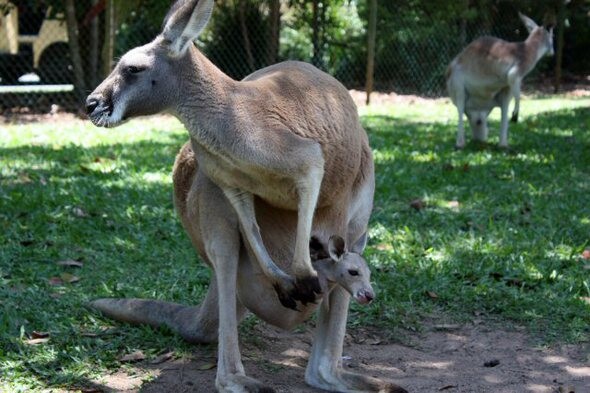hankyoreh
Links to other country sites 다른 나라 사이트 링크
Lack of income preventing “kangaroo tribe” members from moving out of parents’ houses

Statistics show 45.6% of unmarried South Koreans in their thirties living at a house owned by their parents, with over half of them choosing to do so due to lack of income. The numbers indicate that one in every four unmarried South Koreans in their thirties is a member of the so-called “kangaroo tribe” living at their parent’s home. The “kangaroo tribe” consists of unmarried thirty-something living with their parents for economic reasons.
The findings were included in a 2018 report on the “financial lives of ordinary people” published on Mar. 12 by Shinhan Bank. The reports have been released annually since 2016, with e-mail surveys sent to nationwide financial consumers aged 20–64 to identify various correlations between economic activity and lifestyle patterns.
Members of the “kangaroo tribe” accounted for 408 of the 1,636 unmarried respondents aged 30–39, or 24.9%. As reasons for living with their parents, the respondents cited cost-cutting (39.2%), shortage of independent funds (33.4%), and the burden of housing costs (27.4%). A comparison with independent unmarried households from the same age group in terms of economic life showed women and low earners to account for a large percentage of the kangaroo tribe. The kangaroos had an average monthly income of 2.34 million won (US$2,200), or 200,000 won (US$188) less than the 2.54 million won (US$2,388) average for independent households from the same age group.
But those in the kangaroo tribe also showed a higher rate of consumption at 50.4% to the independent households’ 46.4%, with lower rates of saving and surplus funds. Among the kangaroo tribe members, 23.3% received economic support and 69.3% non-economic support from their parents. In contrast, just 12.6% of independent households from the same age group received economic support, while 31.6% received non-economic support.
Prior to 2006, people aged 30–39 represented the largest percentage of those starting businesses at 43.1%. Since 2015, however, they have been overtaken by people aged 20–29 at 34.4%. People aged 50–59 accounted for just 5.2% of those starting small businesses before 2006. The percentage rose to 19.6% for 2012–2014 before falling again to 13.4% since 2015.
Initial start-up funds averaged 92.18 million won (US$86,650), the study showed. Of this amount, 55.4 million won (US$52,080), or 60.1%, was provided by the individual starting a business, while 36.78 million won (US$34,570), or 39.9%, came in the form of assistance from a family member or a loan from a financial institution.
Independent business owners had an average monthly income of 3.19 million won (US$3,000), which was more than the 2.75 million won (US$2,590) average for small business employees but less than the 3.98 million won (US$3,740) average for large business employees.
By Jung Se-ra, staff reporter
Please direct questions or comments to [english@hani.co.kr]

Editorial・opinion
![[Column] Park Geun-hye déjà vu in Yoon Suk-yeol [Column] Park Geun-hye déjà vu in Yoon Suk-yeol](https://flexible.img.hani.co.kr/flexible/normal/500/300/imgdb/original/2024/0424/651713945113788.jpg) [Column] Park Geun-hye déjà vu in Yoon Suk-yeol
[Column] Park Geun-hye déjà vu in Yoon Suk-yeol![[Editorial] New weight of N. Korea’s nuclear threats makes dialogue all the more urgent [Editorial] New weight of N. Korea’s nuclear threats makes dialogue all the more urgent](https://flexible.img.hani.co.kr/flexible/normal/500/300/imgdb/original/2024/0424/7317139454662664.jpg) [Editorial] New weight of N. Korea’s nuclear threats makes dialogue all the more urgent
[Editorial] New weight of N. Korea’s nuclear threats makes dialogue all the more urgent- [Guest essay] The real reason Korea’s new right wants to dub Rhee a founding father
- [Column] ‘Choson’: Is it time we start referring to N. Korea in its own terms?
- [Editorial] Japan’s rewriting of history with Korea has gone too far
- [Column] The president’s questionable capacity for dialogue
- [Column] Are chaebol firms just pizza pies for families to divvy up as they please?
- [Column] Has Korea, too, crossed the Rubicon on China?
- [Correspondent’s column] In Japan’s alliance with US, echoes of its past alliances with UK
- [Editorial] Does Yoon think the Korean public is wrong?
Most viewed articles
- 1[Column] Park Geun-hye déjà vu in Yoon Suk-yeol
- 2Will NewJeans end up collateral damage in internal feud at K-pop juggernaut Hybe?
- 3Why Korea shouldn’t welcome Japan’s newly beefed up defense cooperation with US
- 4N. Korean hackers breached 10 defense contractors in South for months, police say
- 5[Guest essay] The real reason Korea’s new right wants to dub Rhee a founding father
- 6Thursday to mark start of resignations by senior doctors amid standoff with government
- 7[Editorial] New weight of N. Korea’s nuclear threats makes dialogue all the more urgent
- 8[Column] ‘Choson’: Is it time we start referring to N. Korea in its own terms?
- 9Kim Jong-un expressed ‘satisfaction’ with nuclear counterstrike drill directed at South
- 10The dream K-drama boyfriend stealing hearts and screens in Japan